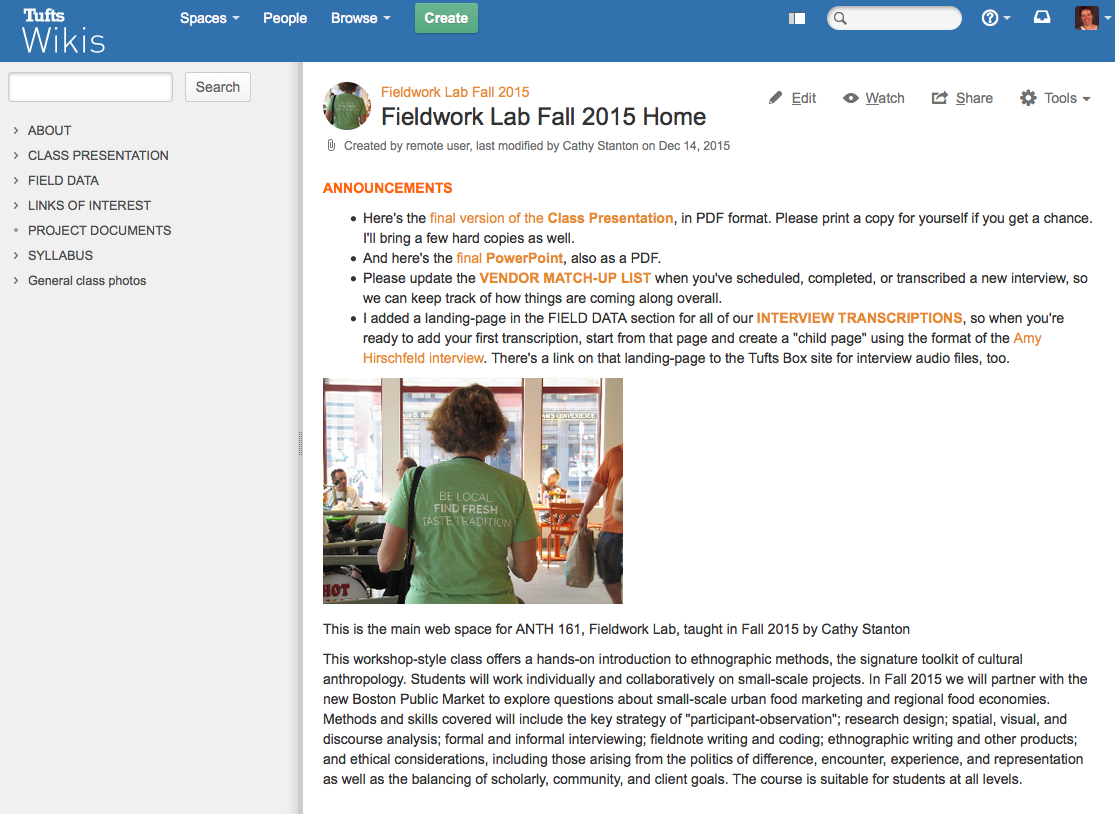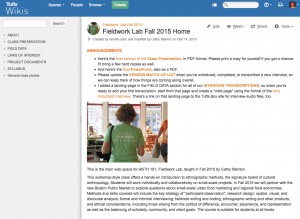Ed Tech Vignette: Anthropology Fieldwork Lab
Instructor: Cathy Stanton
Department: Anthropology – A&S
Course: Fieldwork Lab
Technology Used: Wiki (wikis.uit.tufts.edu)
Site: Private
How ETS supported this: No support was requested. Self-service use case.
Tags: Wikis, Anthropology, Field Work
What were the learning goals for the project?
The class is designed to introduce students to ethnographic methods, the varied set of research tools used by cultural anthropologists. These methods include participant-observation, writing fieldnotes, conducting open-ended interviews, drawing and interpreting maps, and producing and analyzing photos and other kinds of media. For this iteration of the class, we were focusing on the motivations and “food politics” of the first cohort of vendors at the recently-opened Boston Public Market. Students produced small-scale individual projects and contributed to a larger collective presentation to the market’s managers.
In what way did using the wiki service at Tufts support those goals?
A challenge for all cultural anthropologists is to find a way to collect our multi-faceted, often multi-media data in a way that lets us mull it over productively and see what patterns and categories of analysis emerge from it. This is exponentially more of a challenge with a team of student researchers, and we needed a data set that everyone could contribute to, access, search, and code in a (more or less) unified way. The wiki was the perfect tool for building this data set. Students could easily add their own fieldnotes, photos, and interview transcripts and read others’ materials. I was able to frame the developing body of data as we went along, for example by making new landing-pages to call out emerging themes and ideas. When we reached the analysis stage, we were able to collectively parse the data in a number of ways, through keyword searches, color-coding, and gradual building of a cohesive set of presentation materials. Students were also able to share proposals and feedback on their individual projects in progress, as well as on the collective product of our study.
What do you feel went well/not so well in the use of this technology?
Overall, I was very happy with the way this worked for this fall’s class. I’ve used Spark wikis in many previous classes and felt that I had a good handle on how much structure and guidance I needed to provide in order for students to operate fairly independently and effectively within the wiki environment. The analysis and coding phase was somewhat chaotic, and although that’s often the case with the kind of open-ended inquiries that ethnographers conduct, for future classes I’m going to try to develop a clearer pathway (in terms of both process and the wiki structure) through the final stages of the research.
Next Steps/Refinements
I’ll definitely use the wiki for this course again. In fact, one of the reasons to use it for data collection is that we’ll be continuing to work with the same community partner on similar questions in future classes, and students in those classes will be able to access and build on this year’s field data rather than starting from zero. (Our IRB protocol includes approval for future students to read and use data gathered in past semesters.)

